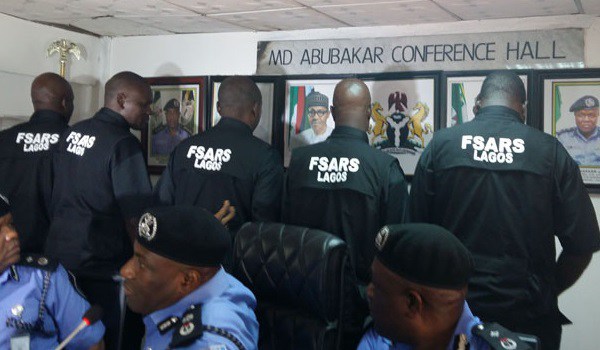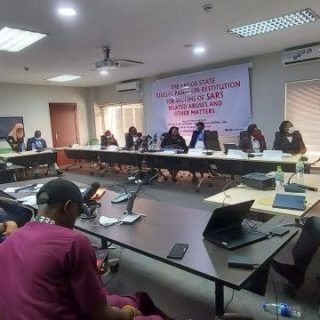Citizen is a column that explains how the government’s policies fucks citizens and how we can unfuck ourselves.
Nothing symbolises how dysfunctional Nigeria has become like the terrorism that is carried out daily by faceless officers of the Special Anti-Robbery Squad (SARS). See, I know we still don’t have 24-hour electricity 60 years after Independence. I know our roads are shite and our hospitals are crappy. But how can some criminals keep terrorising Nigerians because they’re an “Anti-Robbery Squad”? Worse, the government just keeps dancing around the issue without doing something symbolic to solve the problem.
In this article, I will write about the history of SARS itself, and why it was nothing more than a makeshift squad to solve robbery crimes when the police ran away from the streets of Lagos because soldiers were chasing them.
(Wait, what?)
The Killing of Colonel Rimdan
On the night of September 6 September 1992, Ezra Rimdan, a colonel in the Nigerian Army Training and Doctrine Command (TRADOC), Minna, was returning from a visit to an army general in Ikoyi, Lagos. On getting to Herbert Macaulay Road, Yaba, he met a police checkpoint and his driver was ordered to halt, after which he was ordered out of the car.
Soon, in another notorious case of extra-judicial killings by members of the Nigerian Police Force, he was shot dead by the officers on duty. However, unknown to the police, they had just killed an army officer, and they took to their heels when they realised this.
Of course, soldiers were furious, and a full-blown war began between Nigerian soldiers and the Nigerian police. Police officers all across Lagos withdrew from checkpoints and literally hid in their barracks, for fear of being killed by soldiers in reprisal attacks.
It took two weeks of talks led by Brigadier Fred Chijuka, the Director of Defence Information at that time, and other influential soldiers to settle the discord. The three policemen involved in that killing were also sentenced for murder.
The Invention of SARS
You must be wondering, “So how does this killing have anything to do with SARS?”. Just hold on (we’re going home).
Remember that the police were inactive for two weeks because they were afraid? Well, robbers exploited this opportunity to do what they do best. Notorious armed robbers like “Shina Rambo” took control of the streets of Lagos, looting and maiming with reckless abandon.

It was in a bid to solve this crisis that SARS came into the picture. Simeon Danladi Midenda, who was in charge of the Anti-Robbery Unit at the State Criminal Investigation Department in Benin was drafted in by the then Inspector-General of Police, Alhaji Aliyu Attah, to combat the spate of robbery in Lagos that had quadrupled after the Lagos police fled their job.
Because Assistant Commissioner of Police Simeon Midenda had done a great job at bringing robbers to their knees in Benin, there was confidence that he could handle the robbers in Lagos.
When ACP Midenda got to Lagos, he met three senior police officers: the Commissioner of Police in Lagos, James Danbaba. Mike Okiro, Deputy Commissioner of Police (Lagos) Operations, and Abdulyekini Adeoye, Deputy Commissioner of Police (Lagos) Administration. All three told him to set up an anti-robbery team capable of chasing out armed robbers from Lagos. According to Midenda: “To start with, fifteen fully armed men and two plain coloured Peugeot station wagons were given to me.”
Read: Is the DSS Abusing It’s Powers?
Note that there were already anti-robbery squads at the time. In Lagos alone, there were three. One at the Criminal Investigation Department (CID) Alagbon, one attached to the Zone two command, and a third one at the Panti Criminal Investigation Department (CID). So, to differentiate his own anti-robbery squad, Mindenda added “Special” to the squad and called his new team “Special Anti-Robbery Squad” (SARS). They wore plain clothes, drove plain vehicles and could not be identified as government officers.
And that was how SARS was born.
SARS On The Beat (And On The Kill)
To be honest, SARS was very effective in its earliest days. Because they wore plain clothes and carried themselves like “ordinary Nigerians”, it was hard for armed robbers to identify or escape them.
What SARS would do was wait for traditional policemen to chase robbers, after which they would spring up on the robbers at designated points. The robbers would feed them with information about other robberies, and they would use this intelligence to solve other previous and forthcoming robberies.
But this bread and butter situation changed when ACP Midenda was moved from Lagos to the Criminal Investigation Department, Umuahia, in 2002. Many state police commands started their own SARS department, oftentimes without giving them proper orientation, and the original SARS vision was lost.
Today, SARS has become a menace to every Ikechukwu, Sleek and Kolade Johnson, stealing and looting from the same Nigerians they are supposed to protect.
What Can We Learn From This Story?
In December 2017, IGP Ibrahim Idris, concerned about the dastardly acts being perpetrated by SARS, directed that the outfit be re-organised under the office of a Commissioner of Police, who would be the overall head of the Federal Anti-Robbery Squad nationwide under the Department of Operations, Force Headquarters, Abuja. This was after a call to action by then Acting President, Professor Yemi Osinbajo.
Remember that states police commands started having their own SARS commands after the success of Midenda’s SARS squad in Lagos. This decision, made by IGP Idris in 2017, was to put an end to the rot that happened in the system after SARS got decentralised in states. He hoped that the ungodly activities of SARS could be reduced if they were all brought under one command, thus the reason for the F-SARS (Federal Special Anti-Robbery Squad).
In recent years, it is clear that this move has not worked. It is clear that reorganisation is not the solution to the SARS menace and SARS will do bad things under whatever command.
The way I see it, a state of emergency needs to be declared on the Nigerian Police. All of them, including SARS. Our police are not well paid, are poorly trained and are easily the worst people in the Nigerian society. The World Internal Security and Police Index International even rated our police the worst in the world. The worst in the actual world!
So, you can see that we are in a crisis. It’s not just SARS, it’s the entire police. It stinks and needs reforms. Serious ones. Until then, nobody is safe.
Check back every weekday for more Zikoko Citizen stories.




